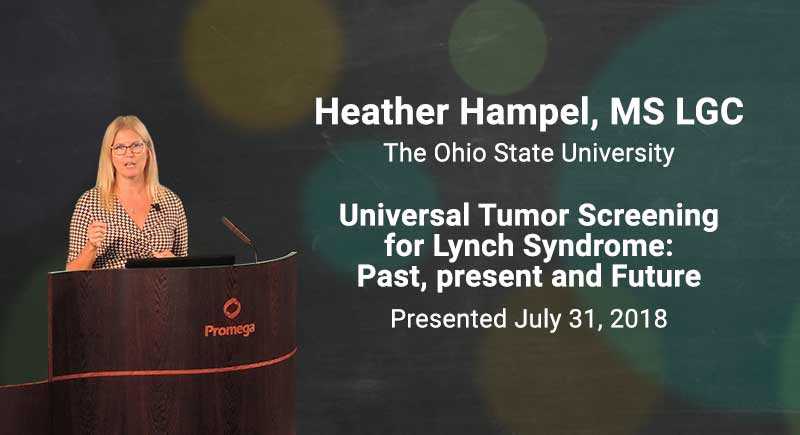The Importance of MSI Status
MSI research associated with cancer from 1993 to 2017


MSI-H as a Biomarker for Cancer Response to Immunotherapy
Tumors with defects in the expression of functional MMR (dMMR) proteins often have somatic mutations that produce novel or “foreign” proteins. These proteins can be immunogenic. As a result, these tumors are effective at priming an immune response and are subsequently susceptible to immunotherapies. Because MSI can be the first evidence of an MMR deficiency, MSI-H status is predictive of a positive response to immunotherapies such as immune checkpoint blockade inhibitors.
MSI-H as a Biomarker for Hereditary Cancer Risk Since 1993
MSI screening has long been recognized as important in the care of patients with colorectal cancer (CRC) or endometrial cancer (EC). High-frequency MSI (MSI-H) is also recognized as a potential marker for germline mutations in certain DNA mismatch repair (MMR) genes associated with Lynch syndrome.
Proficient MMR (pMMR) or Microsatellite Stable (MSS) Status
MMR status assessment is a critical component of care for patients with colorectal cancer (CRC) or endometrial cancer (EC). Proficient MMR (pMMR) or microsatellite stable (MSS), also called Not MSI-H tumors, are characterized by intact mismatch repair mechanisms, which influence their behavior, prognosis, and response to specific treatment strategies.
Advancing Treatment Options for MSS Tumors
In contrast to MSI-H/dMMR tumors, pMMR/MSS/Not MSI-H tumors maintain functional mismatch repair mechanisms and typically have fewer mutations, resulting in limited immunogenicity and reduced responsiveness to immune checkpoint inhibitors as standalone treatments. However, innovative combination therapies that pair these inhibitors with other agents, such as targeted or anti-angiogenic therapies, have emerged as effective options. These new combination therapies have shown the potential to improve survival and delay disease progression in advanced cancers, emphasizing the importance of determining MMR status to guide treatment decisions and optimize outcomes for patients with pMMR/MSS/Not MSI-H tumors.
Deficiencies in DNA mismatch repair (dMMR) can be caused by hereditary, germline mutations or epigenetic silencing by hypermethylation. Lynch syndrome, which is linked to hereditary mutations that cause dMMR, is the most common form of hereditary colorectal cancer. In addition to colorectal cancer, Lynch syndrome increases the lifetime risk of developing certain other cancers(1).
NCCN® guidelines recommend screening for 23 different cancer types by MSI and/or IHC analysis.


Heather Hampel, MS, LGC, talks about her work with MSI and Lynch syndrome.
The Value of Screening Every Tumor for Microsatellite Instability

Genetic counselor Heather Hampel is an advocate for universal tumor screening. Screening all tumors and Lynch-associated cancers can help identify those who have an increased risk for colorectal and other cancers, as well as identifying tumors most likely to respond to immunotherapeutics.
MSI-H Role in Predicting Immunotherapeutic Response
In a paradigm shift for cancer treatment, microsatellite instability status is the first molecular characteristic of cancer that is being used as the sole basis for treatment decisions regardless of tumor morphology (histotype).

The 2015 paper by Le et al.(4) reported the extended analysis on the efficacy of PD-1 blockade in patients with advanced mismatch repair-deficient cancers of both colorectal cancer and non-colorectal origins. Following 41 patients, the study found that patients with mismatch repair deficient tumors, experienced an objective response rate of 40% and a progression-free survival rate of 78%. In contrast, the objective response rate was 0% and the progression-free survival rate was 11% for mismatch repair-proficient patients(4).

MSI as a Research Marker for Immunotherapeutic Response. Presented at the 2017 Annual Meeting of the Association of Molecular Pathology by Dr. James R. Eshleman.
Global Clinical Guideline Recommendations for MSI Testing
Testing for MSI and/or dMMR is Recommended for Universal Tumor Screening and for Guiding Treatment Decisions
National Comprehensive Cancer Network (NCCN) Guidelines
The panel of thirty-two cancer centers recommends tumor testing for MMR defects in all colorectal and endometrial cancers by MSI and/or immunohistochemistry (IHC) analysis. In addition, the panel recommends tumor screening for sebaceous neoplasms as well as small bowel, gastric, pancreas, biliary tract, brain, bladder, urothelial and adrenocortical cancers.
Recommendations for Co-Testing in Solid Tumors
European Society for Medical Oncology (ESMO)
A recent report on immunotherapy in metastatic colorectal cancer showed an unacceptable percentage of patients (almost 10%) had been enrolled in immunotherapy trials and experienced failure due to false positive dMMR or MSI-PCR results assessed by local laboratories. To address these concerns, the consensus panel recommended that patients with Lynch syndrome-related cancers be evaluated using both MSI and MMR by IHC to determine eligibility for immune checkpoint inhibitor treatments(5).
Recommendations for dMMR Detection in Patients with Solid Tumor Malignancies Being Considered for ICI Therapy
College of American Pathologists (CAP), Association of Molecular Pathology (AMP), American Society of Clinical Oncology (ASCO), Fight Colorectal Cancer (Fight CRC)
The College of American Pathologists (CAP), in collaboration with the Association of Molecular Pathology (AMP), American Society of Clinical Oncology (ASCO), and patient advocacy group Fight Colorectal Cancer (Fight CRC) convened a multidisciplinary expert and advisory panel to develop evidence-based guidelines to identify the optimal clinical laboratory test to identify defects in DNA mismatch repair (dMMR) in patients with solid tumor malignancies who are being considered for immune checkpoint inhibitor (ICI) therapy(6,7).
The guidelines outline the following testing recommendations: MMR-IHC and/or MSI by PCR for colorectal cancer patients although a validated MSI by NGS test can also be used, MMR-IHC and/or MSI by PCR over MSI by NGS for patients with gastroesophageal and small bowel cancer, MMR-IHC over MSI by PCR or NGS for endometrial cancer patients, and for all other cancer types DNA mismatch repair should be tested for, although the optimal detection approach has not been established.
The guidelines also state that, for all cancer patients with solid tumor malignancies being considered for ICI therapy based on dMMR, TMB should not be used as a surrogate for the detection of dMMR defects. If a tumor is identified as TMB-High, perform IHC and/or MSI by PCR to determine if high TMB is secondary to dMMR.
References
- Latham, A. et al. (2018) Microsatellite Instability Is Associated With the Presence of Lynch Syndrome Pan-Cancer. J. Clin. Oncol. 36, 1–9.
- Win, A.K. et al. (2016) Prevalence and Penetrance of Major Genes and Polygenes for Colorectal Cancer. Cancer Epidemiol Biomarkers Prev. 26(3), 404–412.
- Cancer.gov. Cancer MoonshotSM Blue Ribbon Panel. Accessed March 16, 2022.
- Le, D.T. et al. (2015) PD-1 Blockade in Tumors with Mismatch-Repair Deficiency. New Engl. J. Med. 372, 2509–20.
- Luchini, C. et al. (2019) ESMO recommendations on microsatellite instability testing for immunotherapy in cancer, and its relationship with PD-1/PD-L1 expression and tumour mutational burden: a systematic review-based approach. Annals of Oncol. 30, 1232–1243.
- Bartley, A.N. et al. (2022) Mismatch Repair and Microsatellite Instability Testing for Immune Checkpoint Inhibitor Therapy. Arch. Pathol. Lab. Med. doi: 10.5858/arpa.2021-0632-CP
- Vikas, P. et al. (2023) Mismatch Repair and Microsatellite Instability Testing for Immune Checkpoint Inhibitor Therapy: ASCO Endorsement of College of American Pathologists Guideline. J. Clin. Oncol. JCO2202462. doi:10.1200/jco.22.02462